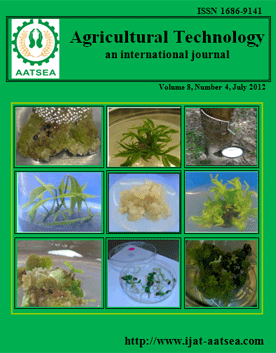ThaiScience
ThaiScience
INTERNATIONAL JOURNAL OF AGRICULTURAL TECHNOLOGY
Volume 16, No. 01, Month JANUARY, Year 2020, Pages 207 - 222
Encapsulation of pediococcus pentosaceus rsu-nh1 into pectinsodium alginate and chitosan coating
Yodsenee, K., Showpanish, K., Sonhom, N., Pilasombut, K., Prachom, N., Sathitkowitchai, W., Buathong, R. and Rumjuankiat, K.
Abstract Download PDF
Lactic acid bacteria (LAB) are beneficial to the human intestines, they inhibit the growth of pathogenic microorganisms and are used for lactic acid fermentation. LAB are partially digested when they pass through the digestive system, resulting in reduced survival rate. Encapsulation can be used to enhance the survival of probiotic bacteria as protection against harsh conditions in the gastrointestinal tract. Results indicated that the initial cell numbers of Pediococcus pentosaceus RSU-Nh1, free cells survived with 7.68 log CFU/ml, whereas encapsulation using sodium alginate combined with various pectins extracted from pomelo and passion fruit peel exhibited free cell survival with 7.35 and 8.12 log CFU/ml, respectively. Encapsulation by combining chitosan with shrimp shells and fish scales showed cell survival rates of 8.59 and 8.08 log CFU/ml, respectively, while encapsulation with pectin from passion fruit coated with chitosan from shrimp shells showed the highest number of Ped. pentosaceus RSU-Nh1 with 9.24 log CFU/ml in gastrointestinal simulation. It revealed that encapsulation improved the survival of Ped. pentosaceus RSU-Nh1 in simulated gastrointestinal conditions.
Keywords
encapsulation, lactic acid bacteria, pectin, chitosan, simulationINTERNATIONAL JOURNAL OF AGRICULTURAL TECHNOLOGY
Published by : Association of Agricultural Technology in Southeast Asia (AATSEA)
Contributions welcome at : http://www.ijat-aatsea.com
